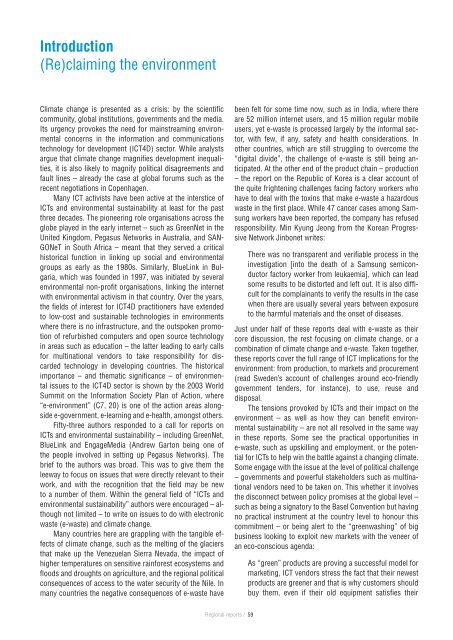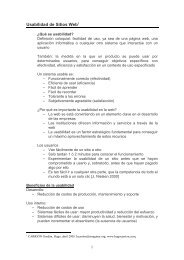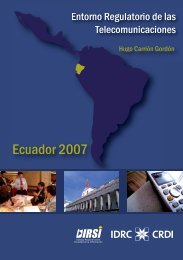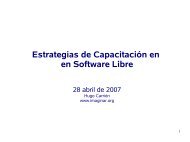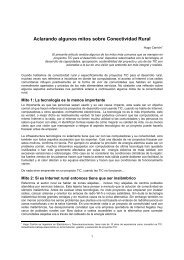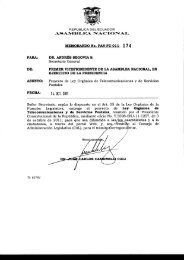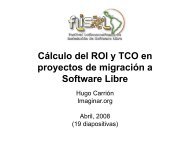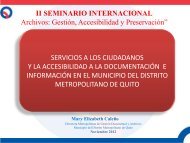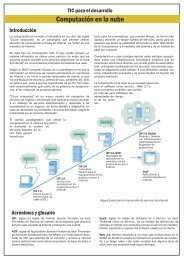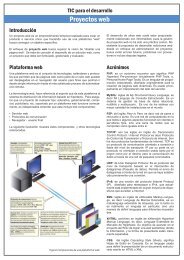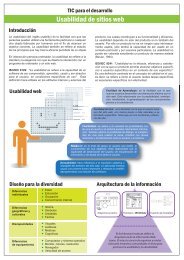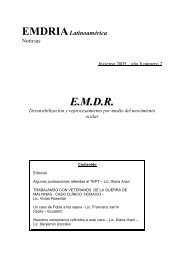GLOBAL INFORMATION SOCIETY WATCH 2010
GLOBAL INFORMATION SOCIETY WATCH 2010
GLOBAL INFORMATION SOCIETY WATCH 2010
You also want an ePaper? Increase the reach of your titles
YUMPU automatically turns print PDFs into web optimized ePapers that Google loves.
Introduction<br />
(Re)claiming the environment<br />
Climate change is presented as a crisis: by the scientific<br />
community, global institutions, governments and the media.<br />
Its urgency provokes the need for mainstreaming environmental<br />
concerns in the information and communications<br />
technology for development (ICT4D) sector. While analysts<br />
argue that climate change magnifies development inequalities,<br />
it is also likely to magnify political disagreements and<br />
fault lines – already the case at global forums such as the<br />
recent negotiations in Copenhagen.<br />
Many ICT activists have been active at the interstice of<br />
ICTs and environmental sustainability at least for the past<br />
three decades. The pioneering role organisations across the<br />
globe played in the early internet – such as GreenNet in the<br />
United Kingdom, Pegasus Networks in Australia, and SAN-<br />
GONeT in South Africa – meant that they served a critical<br />
historical function in linking up social and environmental<br />
groups as early as the 1980s. Similarly, BlueLink in Bulgaria,<br />
which was founded in 1997, was initiated by several<br />
environmental non-profit organisations, linking the internet<br />
with environmental activism in that country. Over the years,<br />
the fields of interest for ICT4D practitioners have extended<br />
to low-cost and sustainable technologies in environments<br />
where there is no infrastructure, and the outspoken promotion<br />
of refurbished computers and open source technology<br />
in areas such as education – the latter leading to early calls<br />
for multinational vendors to take responsibility for discarded<br />
technology in developing countries. The historical<br />
importance – and thematic significance – of environmental<br />
issues to the ICT4D sector is shown by the 2003 World<br />
Summit on the Information Society Plan of Action, where<br />
“e‐environment” (C7, 20) is one of the action areas alongside<br />
e‐government, e‐learning and e‐health, amongst others.<br />
Fifty-three authors responded to a call for reports on<br />
ICTs and environmental sustainability – including GreenNet,<br />
BlueLink and EngageMedia (Andrew Garton being one of<br />
the people involved in setting up Pegasus Networks). The<br />
brief to the authors was broad. This was to give them the<br />
leeway to focus on issues that were directly relevant to their<br />
work, and with the recognition that the field may be new<br />
to a number of them. Within the general field of “ICTs and<br />
environmental sustainability” authors were encouraged – although<br />
not limited – to write on issues to do with electronic<br />
waste (e‐waste) and climate change.<br />
Many countries here are grappling with the tangible effects<br />
of climate change, such as the melting of the glaciers<br />
that make up the Venezuelan Sierra Nevada, the impact of<br />
higher temperatures on sensitive rainforest ecosystems and<br />
floods and droughts on agriculture, and the regional political<br />
consequences of access to the water security of the Nile. In<br />
many countries the negative consequences of e‐waste have<br />
been felt for some time now, such as in India, where there<br />
are 52 million internet users, and 15 million regular mobile<br />
users, yet e‐waste is processed largely by the informal sector,<br />
with few, if any, safety and health considerations. In<br />
other countries, which are still struggling to overcome the<br />
“digital divide”, the challenge of e‐waste is still being anticipated.<br />
At the other end of the product chain – production<br />
– the report on the Republic of Korea is a clear account of<br />
the quite frightening challenges facing factory workers who<br />
have to deal with the toxins that make e‐waste a hazardous<br />
waste in the first place. While 47 cancer cases among Samsung<br />
workers have been reported, the company has refused<br />
responsibility. Min Kyung Jeong from the Korean Progressive<br />
Network Jinbonet writes:<br />
There was no transparent and verifiable process in the<br />
investigation [into the death of a Samsung semiconductor<br />
factory worker from leukaemia], which can lead<br />
some results to be distorted and left out. It is also difficult<br />
for the complainants to verify the results in the case<br />
when there are usually several years between exposure<br />
to the harmful materials and the onset of diseases.<br />
Just under half of these reports deal with e‐waste as their<br />
core discussion, the rest focusing on climate change, or a<br />
combination of climate change and e‐waste. Taken together,<br />
these reports cover the full range of ICT implications for the<br />
environment: from production, to markets and procurement<br />
(read Sweden’s account of challenges around eco-friendly<br />
government tenders, for instance), to use, reuse and<br />
disposal.<br />
The tensions provoked by ICTs and their impact on the<br />
environment – as well as how they can benefit environmental<br />
sustainability – are not all resolved in the same way<br />
in these reports. Some see the practical opportunities in<br />
e‐waste, such as upskilling and employment, or the potential<br />
for ICTs to help win the battle against a changing climate.<br />
Some engage with the issue at the level of political challenge<br />
– governments and powerful stakeholders such as multinational<br />
vendors need to be taken on. This whether it involves<br />
the disconnect between policy promises at the global level –<br />
such as being a signatory to the Basel Convention but having<br />
no practical instrument at the country level to honour this<br />
commitment – or being alert to the “greenwashing” of big<br />
business looking to exploit new markets with the veneer of<br />
an eco-conscious agenda:<br />
As “green” products are proving a successful model for<br />
marketing, ICT vendors stress the fact that their newest<br />
products are greener and that is why customers should<br />
buy them, even if their old equipment satisfies their<br />
Regional reports / 59


